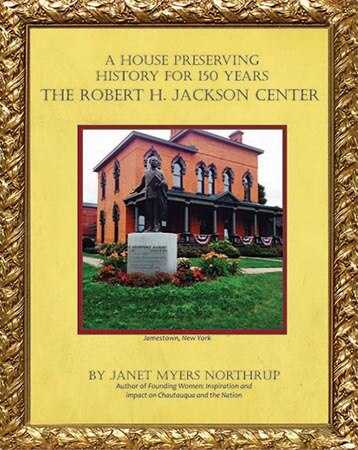
We had the privilege to be a part of a fascinating interview of author Janet Northrup today. Janet was raised in Jamestown where she attended family events at the Consistory, now the Robert H. Jackson Center. Her father and grandfather were Masons. Janet taught English Language Arts in Fairport, NY. She wrote the book Founding Women: Inspiration and Impact on Chautauqua and the Nation for the Chautauqua Women's Club.
Janet sat across from Greg Peterson, who led the interview (which was also recorded). In attendance were several of the RHJ Center's docents, who lead tours around the facility. They were there to glean from some of great information Janet was about to provide.
To begin, we learned that Greg and Janet lived in the same neighborhood of Jamestown.
As the interview progressed, we first learned that the Jackson Center has had 5 owners since it was built back in 1859. The architects were Warren and Wetmore. According to Wikipedia, Warren and Wetmore was an architecture firm in New York City which was a partnership between Whitney Warren (1864–1943) and Charles Delevan Wetmore (June 10, 1866[1] – May 8, 1941), that had one of the most extensive practices of its time and was known for the designing of large hotels.
Among Warren and Wetmore's accomplishments are Grand Central Terminal and several other train terminals here in the U.S. and abroad.
The Jackson Center mansion was also the first permanent residence in Jamestown as it was built with brick. The first owner was Alonzo Kent, who came to Jamestown from Vermont with no money and just a few meager possessions. Over time, he gathered wealth, and actually donated $10,000 to the Methodist Church to buy property along Chautauqua Lake where Chautauqua Institution now sits. Alonzo and his wife Mercy had 5 children, 3 of which who reached adulthood, but later moved away from Jamestown.
Janet told a story of a visit made in the 1870's by Ulysses S. Grant who was traveling through the region. When Alonzo Kent was asked to host lunch with Grant, he initially declined because he felt his home wasn't good enough to host the President. Since then, the mansion and center have hosted several dignitaries.
The second owner of the mansion was Alba Kent and Rose Hall Wetmore Kent. Alba also built the Kent House Hotel in Lakewood, and bred Black Angus cattle (one of the first people to do so in the U.S.). The Kent House burned down, and the location where it stood is now where the Yacht Club stands.
Rose had amassed a fortune because her first husband, C.C. Wetmore, left her all his money. Born in Busti, Rose's family owned huge amounts of land in Chautauqua County. Rose was also a member of the Christian Scientist Church, and reportedly had a tunnel built between the mansion and the church across the street so she come and go as she pleased.
Rose's son also lived in NYC and would often bring famous friends of his home to preform at theaters in Jamestown.
During this portion of the interview, Janet also mentioned that were we meet each Monday was originally where the horse stables were for the mansion. When the Jamestown Consistory bought the building in 1920 (for $20,000), they transformed the space into what it is today. It is believed that Lucille Ball performed on the Consistory stage a time or two.
Janet recalled coming to the Consistory as a child and learning to play billiards in the 2nd floor billiards room. She was also amazed that when her and her friends were brought to meetings, they were left to roam the building as they pleased.
The Jamestown Consistory Rose Croix Chapter owned the building from 1920 to 2001. After sitting empty for nearly 2 years, the Robert H. Jackson Center purchased the facility, and has been there ever since.
We all marveled at the tales told by Janet, and many of us were eager to buy a copy of her book A House Preserving History For 150 Years The Robert H. Jackson Center.
In honor of her attendance and presentation, a donation was made to the End Polio Now Campaign, which Janet was very happy to learn.